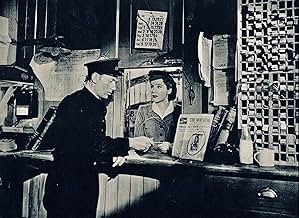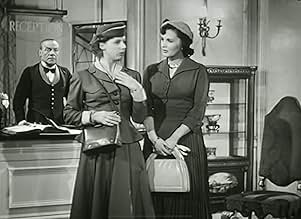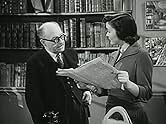Agrega una trama en tu idiomaAn attractive young girl has the power to stop all kinds of machinery.An attractive young girl has the power to stop all kinds of machinery.An attractive young girl has the power to stop all kinds of machinery.
- Dirección
- Guionistas
- Elenco
Michael Balfour
- Crook
- (sin créditos)
Vincent Ball
- Hero in cinema sequence
- (sin créditos)
Geoffrey Bellman
- Lorry Driver
- (sin créditos)
Opiniones destacadas
Set in the sleepy little village of Slipford, "a village bypassed by progress", and described by the late David Shipman as "so silly it was not released". The use of the much-vaunted Dynamic Frame process makes this extraordinary folly look simultaneously cheap & amateurish and yet also rather avant-garde in the style of Karel Zeman's animated fantasies of the fifties and sixties.
And it's impossible not to like a film in which Basil Radford & Naunton Wayne keep popping up in cameo roles as 'The Mechanical Types'.
And it's impossible not to like a film in which Basil Radford & Naunton Wayne keep popping up in cameo roles as 'The Mechanical Types'.
10plan99
A very interesting plot and very well acted by all concerned. I did know someone who could not wear a watch as they always stopped so the plot does have a ring of truth to it. It runs along very nicely and has a great ending.
On the outside, Jennifer appears to be a normal girl. However, she has a special power which is so far unknown to her, it's hereditary and passed down through the females of the family: the power to stop ALL machinery. It takes 15 minutes to do so, and does not work if she is asleep, those are the only 'rules'. Now this doesn't affect her so much as she lives in a sleepy little town that is still all horse and cart, but her boyfriend is a watch maker who owns a car, so there's some problems there (that just seem odd coincidences since neither of them know), but when Jennifer goes away to London, that's when the real fun starts!
A lovely little English screwball comedy, and see if you recognise Jennifer as Truly Scrumptious from 'Chitty Chitty Bang Bang' - 20 years younger. 10/10!
A lovely little English screwball comedy, and see if you recognise Jennifer as Truly Scrumptious from 'Chitty Chitty Bang Bang' - 20 years younger. 10/10!
During the 40's and 50's, Britain produced a series of delightfully goofy comedies. Some, such as Passport to Pimlico (1949), Whiskey Galore (1949), The Lavender Hill Mob (1951), The Man in the White Suit (1951), Genevieve (1953), The Titfield Thunderbolt (1953), and The Green Man (1956), are well known. But others just as good, such as Let George Do It! (1940) and Stop Press Girl (1949), have been overlooked.
This latter deals with an unwitting young woman who somehow stops all machinery she is around. The idea is novel and the pacing never drags. Though, as the woman, Sally Ann Howes' performance is nothing special, Gordon Jackson, one of the most likeable actors ever to appear on screen, does a fine job as her ardent suitor. So do James Robertson Justice--who pepped up every picture he was in--and Joyce Barbour as Howes' uncle and aunt. (While they know about her power, neither has informed her of it.) And as reporter Jackson's rival, and frustrated want-to-be sweetheart, Sonia Holm is convincingly catty. Finally, that redoubtable English pair, Basil Radford and Naunton Wayne, perhaps best remembered from The Lady Vanishes (1938), show up in five enjoyable cameos as different sets of mechanical types: train operators, bus operators, watchmakers, cinema projectionists, and pilots.
This latter deals with an unwitting young woman who somehow stops all machinery she is around. The idea is novel and the pacing never drags. Though, as the woman, Sally Ann Howes' performance is nothing special, Gordon Jackson, one of the most likeable actors ever to appear on screen, does a fine job as her ardent suitor. So do James Robertson Justice--who pepped up every picture he was in--and Joyce Barbour as Howes' uncle and aunt. (While they know about her power, neither has informed her of it.) And as reporter Jackson's rival, and frustrated want-to-be sweetheart, Sonia Holm is convincingly catty. Finally, that redoubtable English pair, Basil Radford and Naunton Wayne, perhaps best remembered from The Lady Vanishes (1938), show up in five enjoyable cameos as different sets of mechanical types: train operators, bus operators, watchmakers, cinema projectionists, and pilots.
There are some priceless hilarious moments in this ambiguous comedy about a young innocent girl who happens to have a disastrous influence on any kind of machinery. Basil Radford and Naunton Wayne in a number of supporting roles play an important part in adding to the comedy. The idea is actually rather serious: who has not experienced the frustration when for instance a computer just will not cooperate? And you must suspect that somehow your second thoughts could have had some influence on the inexplicable problem, which no mechanic expertise can solve. When science stands powerless and logic doesn't work, there is always superstition. The most wonderful scene in this boosting of the problem is the cinema scene, both on screen, in the audience and in the projector room (with Basil Radford and Naunton Wayne). The idea is good and made the best of, and there are plenty of hearty laughs. James Robertson Justice as an implacable dentist and Gordon Jackson as rhe incorrigible journalist add to the entertainment while Sally Ann Howe's perfect innocence is the centerpiece.
¿Sabías que…?
- TriviaThe "Mechanical Types" played by Basil Radford and Naunton Wayne are not one pair of characters, but several different roles, working on trains, buses, aeroplanes, in cinemas and as watchmakers.
- ErroresThe aircraft used is shown in exterior shots to be a civil version of the Halifax bomber, but the lavish interior of the fuselage appears to be much too wide for that type, and the big square windows shown in interior shots are not present on the exterior. In fact, the aircraft shown in exteriors, G-AKEC, appears to have been used for freight, not for passengers.
- Citas
Jennifer Peters: Why do you Scotsmen leave your country if you're so fond of it.
Jock Melville: Someone's got to civilise the world. Surely you realise Scotland's chief exports are brains and whiskey.
Selecciones populares
Inicia sesión para calificar y agrega a la lista de videos para obtener recomendaciones personalizadas
Detalles
- Tiempo de ejecución1 hora 18 minutos
- Color
- Relación de aspecto
- 1.37 : 1
Contribuir a esta página
Sugiere una edición o agrega el contenido que falta

Principales brechas de datos
By what name was Stop Press Girl (1949) officially released in Canada in English?
Responda




























